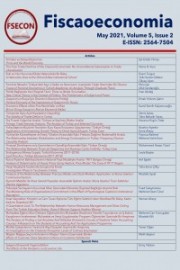Yoksullaştıran Büyüme Teorisinin Kuru Kayısı İhracatına Uygulanması: Türkiye Örneği
Application of Immiserizing Growth Theory to Dried Apricot Export: Turkey Case
Author(s): İbrahim Aytekin, Emre AksoySubject(s): Agriculture, International relations/trade, Methodology and research technology
Published by: Ahmet Arif Eren
Keywords: Export; Dried Apricots; Turkey; Immiserizing Growth; ARDL; Toda-Yamamoto;
Summary/Abstract: Increases in export quantities can sometimes cause the terms of trade to deteriorate. This deterioration in terms of trade may later lead to a decline in export revenues and loss of welfare. This situation forms the basis of the theory called "Immiserizing Growth" in the literature. The purpose of this study is to investigate whether dried apricot, that Turkey is the first in terms of production and export, leads to immiserizing growth. For this purpose, amount of dried apricot exports and dried apricot exports revenue for the last 50 years were examined within the scope of the immiserizing growth hypothesis. The study investigates this relationship by both using ARDL bound test approach and Toda-Yamamoto causality test. According to the results of ARDL bound test approach, a cointegration relationship was found between dried apricot export and dried apricot export revenue. In addition, the long run parameter estimates are statistically significant. According to the Toda-Yamamoto causality test, a unidirectional causality relationship is obtained and it runs from dried apricot export to dried apricot export revenue. Over the period between 1970 and 2019, the results suggest that immiserizing growth is not a valid hypothesis for the dried apricot export cannot in Turkey.
Journal: Fiscaoeconomia
- Issue Year: 5/2021
- Issue No: 2
- Page Range: 538-555
- Page Count: 18
- Language: Turkish

